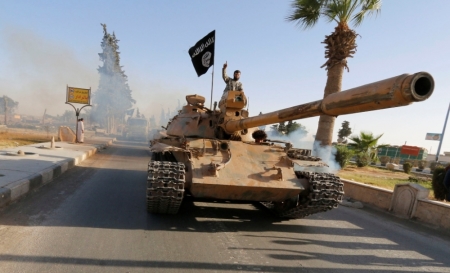Vatican Condemns ISIS' Destruction of Iraq's Oldest Christian Monastery Where US Troops Would Pray

The Islamic State terror group has razed to the ground Iraq's oldest Christian monastery where U.S. troops would worship until recently, in an apparent attempt to erase the region's history, receiving strong condemnation from around the world, including from the Obama administration and the Vatican.
Islamic State, also known as ISIS or ISIL, destroyed the 1,400-year-old St. Elijah's monastery in Mosul just months after taking over the Iraqi city in June 2014, The Associated Press reported with satellite images Wednesday, saying the terrorists demolished the structure in late September.
"Bulldozers, heavy equipment, sledgehammers, possibly explosives turned those stone walls into this field of gray-white dust. They destroyed it completely," Stephen Wood, CEO of Allsource Analysis, was quoted as saying.
The monastery was locally known as Dair Mar Elia, the name of Assyrian Christian monk St. Elijah who built it.
ISIS, an offshoot of al-Qaeda which seeks to establish a caliphate in the Levant region and now controls large parts of Syria and Iraq, has destroyed more than 100 religious and historic sites in the two countries.
The Rev. Paul Thabit Habib, the leader of the Chaldean Catholic Church in Mosul until he fled the city, was quoted as saying that he "can't describe my sadness."
"Our Christian history in Mosul is being barbarically leveled. We see it as an attempt to expel us from Iraq, eliminating and finishing our existence in this land," he said.
"We see these historical sites destroyed on daily basis," he added, according to CNN. "This is a big loss. This will never be replaced ... it goes back to the sixth century. We are talking about history of civilization being wiped out."
State Department spokesman Mark Toner said Wednesday the Obama administration condemned the destruction. "They continue to carry out these kinds of depraved acts, and it really symbolizes or exemplifies their bankrupt ideology," he said.
Vatican spokesman Rev. Federico Lombardi called the destruction "sad and dramatic."
"Unfortunately, there is this systemic destruction of precious sites, not only cultural, but also religious and spiritual. It's very sad and dramatic," Lombardi was quoted as saying.
UNESCO Director General Irina Bokova also condemned the demolition. "Despite their relentless crimes, extremists will never be able to erase history," he said. "It also reminds us how terrified by history the extremists are, because understanding the past undermines the pretexts they use to justify these crimes and exposes them as expressions of pure hatred and ignorance."
Christians are among the main civilian targets of IS.





















